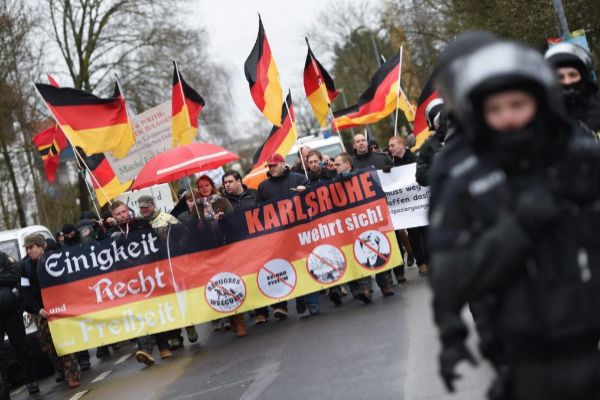- Czech Republic: Czech police investigate the sale of Hitler's masks in Prague
- Nazism: Stupor in Germany for a parade of uniformed neo-Nazis
The German city of Dresden, capital of the federated state of Saxony and cradle of the Islamophobic and anti-immigration movement Pegida, has declared the state of "Nazi emergency."
In a motion passed by 39 votes in favor and 29 against, the session recognizes that the city has a serious problem with the extreme right and is committed to strengthening the democratic culture. This is an unprecedented resolution, although the progress of neo-Nazism faced by Germany can be seen not only in the country's statistics, but also at the polls.
"Attitudes and actions undemocratic, antipluralist, misanthropic and extreme right-wing extremists, including violence, occur more frequently" reflects the resolution, which was supported by all parties, except Alternative for Germany (AfD) and the Union Christian Democrat (CDU).
The Alternative vote for Germany was consistent, while the motion points directly to its electorate. The CDU, party of Chancellor Angela Merkel , spoke of "mere symbol policy" and "semantic errors."
"From our point of view, all this is provocation," said CDU leader in Dresden, Jan Donhauser.
"State of emergency means collapse or serious threat to public order and this circumstance does not occur. It is not justified. We are the guardians of the pillars and nonviolence of the liberal democratic order, regardless of where that extremism comes from," Donhauser said and added that the "vast majority of the inhabitants of Dresden are neither right-wing extremists nor undemocratic."
And yet, the city of Dresden has always been related to the extreme right . Since the early 1990s, neo-Nazi groups have gathered here to remember what they call "Holocaust bombs" in reference to the air raid perpetrated by British and American aviation in 1945, when World War II was already settled.
With the refugee crisis that broke out in 2015, Dresden became the seed of Patriots against the Islamization of the West (Pegida).
The movement, which gathered thousands of people in its demonstrations every Monday, is led by Lutz Bachmann , who has repeatedly sentenced for crimes related to the exaltation of hatred and use of Nazi slogans.
The Pegida marches are, five years later, almost residual, but their links with Alternative for Germany remain intact , especially those that it maintains with the most radical wing of the party.
The leader of this current, Björn Höcke , has traveled repeatedly from the neighboring state of Thuringia, also in what used to be Communist Germany, to join the manifestations of Pegida.
In the recent regional elections held in Thuringia and Saxony, Alternative for Germany became the second most voted force.
The declaration of "Nazi emergency" may not go beyond symbolism, but gestures matter in politics.
The declaration appeals to municipal authorities and civil society organizations to favor democratic culture and protect minorities and victims of violence from the extreme right. It also calls for focusing "on the causes and consequences of anti-Semitism, racism and the extreme right, and stresses the importance of restoring confidence in democratic institutions, the defense of diversity and solidarity."
In the words of Max Aschenbach , leader of the Party, forerunner of the resolution, "the fight against the extreme right begins at the moment when the authorities recognize that there is a problem. And Dresden has a problem with the Nazis."
According to the criteria of The Trust Project
Know more- Germany
- Peg
- WWII
- Angela Merkel
- Ultras
Germany: The oldest man in Germany and the world dies at 114
GermanyGerman Social Democrats must go to a second round in their primary
Germany 'The Wing', the toughest faction of the German ultra-right that has swept Thuringia

